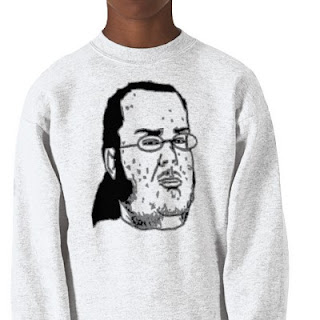 |
| It's like looking in a mirror. |
But, despite some
recent weight gain, I don’t believe cheering the metal has turned me into that
nerd guy. Rather, I now better understand the relationship between fear and
power.
Fearful followers can magnify an extant power. I fell asleep thinking about this
and dreamt an interesting illustration of it. I pictured about twenty members
of Earth, Wind & Fire performing for SNL, funking it up. For some reason, Elijah
Wood came onstage dressed as an Orthodox Jew and complained that he lacked the
necessary funk to perform a bar mitzvah he had coming up. Rafiki, Mufasa and
Yoda gathered round him and agreed that he was short on chutzpah, and then
directed him to observe the laughing, floating head of a cyborg Stalin, obviously
the epitome of funky power.
 |
| Iosif Vissarionovich Dzhugashvili (1878-1953) |
All that’s to say that
Stalin’s cult of personality was so powerful that it translates across a century
and into the head of a half-robot. More seriously, Stalin was so powerful and
feared that I read one quarter of Russians would vote for him were he running
for office today. Russian leaders are usually strong men, and Stalin outdid
many of them. Someone once asked Khrushchev why he didn’t do anything to stop
Stalin’s brutality. Khrushchev snapped and shouted, “Who said that?!” The room
went silent. Khrushchev then asked, “Nobody? Well, now you know why.” Stalin’s
power was validated by the millions of people who feared him.
Which does not mean,
however, that power only survives insofar as it’s feared. In Lewis’s Last Battle, an ape heretically claims
that Tash is Aslan and Aslan is Tash. Excuse the length of this block quote,
but it’s a really good example of how fearless opposition to power does not necessarily
undo it:
Up till now the King and Jewel had said nothing: they were waiting until the Ape should bid them speak, for they thought it was no use interrupting. But now, as Tirian looked round on the miserable faces of the Narnians, and saw how they would all believe that Aslan and Tash were one and the same, he could bear it no longer.
“Ape,” he cried with a great voice, “you lie damnably. You lie like a Calormene. You lie like an Ape.”
He meant to go on and ask how the terrible god Tash who fed on the blood of his people could possibly be the same as the good Lion by whose blood all Narnia was saved. If he had been allowed to speak, the rule of the Ape might have ended that day; the Beasts might have seen the truth and thrown the Ape down. But before he could say another word two Calormenes struck him in the mouth with all their force, and a third, from behind, kicked his feet from under him. And as he fell, the Ape squealed in rage and terror.
“Take him away. Take him away. Take him where he cannot hear us, nor we hear him. There tie him to a tree. I will - I mean, Aslan will - do justice on him later.”
King Tirian fearlessly
opposed this newly powerful ape, and the ape captured, bound and killed him. I
realize that power ultimately loses the Last Battle, but fearless opposition
thereto resulted in immediate and real consequences. Similarly, hostage-takers are
unimpressed with heroes and usually kill them.
On that hopeful note,
I affirm that in other circumstances fearless opposition can undo power. But whether
it’s V detonating Parliament and killing those fictional British despots or Éowyn
declaring she is no man and slaying the Witch-king of Angmar, fearlessness
tends to magnify whoever expresses it. V is made a relatable character and not
a frightening Übermensch by his love for Natalie Portman and troubled past. The
only reason we don’t fear Éowyn will install herself as a tyrannical Queen of
Rohan is because she is so meek.
The best example of
fearlessness undoing power and then undoing itself comes from Beowulf, namely, in the person of
Beowulf. Though he sailed to foreign shores and slew Grendel and his mother, he
ultimately trusted too much in his own power and was slain by a dragon in his
own kingdom. He didn’t even slay the dragon himself; Wiglaf had to aid him.
Only Led Zeppelin would make a song about immigrants a song about Vikings.
So what am I saying? Fright
can make might, might can crush fight, and proud fight can crush itself. And
yes, it is pretty metal to live in a world of just fear and power, winning and
losing by strength and confidence alone. But there are other, totally
irrational ethics. I need a four-letter word that rhymes with shove.